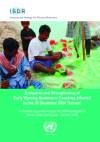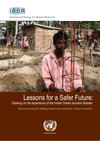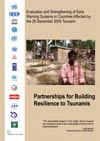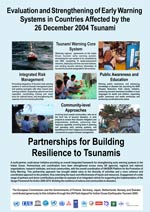
International Strategy for Disaster Reduction
Platform for the Promotion of Early Warning
 |
|
International Strategy for Disaster Reduction |
TSUNAMI |
|
| Archive of project highlights | ||
| During the Economic and Social Council Substantive session of 2007 in Geneva, 2-27 July 2007, a report of the Secretary-General has been prepared on strengthening emergency relief, rehabilitation, reconstruction and prevention in the aftermath of the Indian Ocean tsunami disaster. Document: A-62-83_E-2007-67 |
||
 |
This brochure contains all activities and outputs under the United Nations Flash Appeal "Evaluation and Strengthening of Early Warning Systems in Countires Affected by the 26 December 2004 Tsunami". This initiative has provided an overall integrated framework for strengthening early warning systems in the Indian Ocean. | |
 |
“Lessons for a Safer Future” draws on the experiences of many organisations and individuals during and following the tsunami. The report offers eleven lessons as a contribution to the ongoing process of learning how nations, communities and individuals can become better prepared for and reduce the risk of potential natural hazards. | |
 |
Partnerships for Building Resilience to Tsunamis, the new brochure provides an overview of the achievements made in the four core elements of the tsunami early warning initiative, (i) tsunami warning core system, (ii) integrated risk management, (iii) community-level approaches, and (iv) public awareness and education. | |
 |
Partnership for Building Resilience to Tsunami |
|
| Workshop on Human Impact of Tsunami and Disaster Risk Reduction The workshop was held in Bangkok from 16-17 June 2006, presented studies on human vulnerability to tsunamis addressing the existing gaps in risk and vulnerability assessments. Researchers, policy-makers, and disaster management experts shared research findings and experiences from their work in tsunami-affected countries. The workshop also identified national and regional needs and priorities for future research and policy initiatives in order to sustain long-term disaster risk reduction work in the region. Summaries of the following studies are electronically available: Vulnerability Assessment in Sri Lanka at the Local Level (UNU/EHS) Elements to Develop a Tsunami Early-Warning Plan for the City of Galle in Sri Lanka (UNU/EHS) Risk Factors for Mortality and Injury: Post-tsunami Epidemiological Findings from Tamil Nadu, India (CRED) Tsunami Mortality and Displacement in Aceh Province, Indonesia (Johns Hopkins University) |
||
| Proposed
Strategy for Building Resilience to Tsunamis in the Indian Ocean
2006-2008 The strategy aims to capitalize on achievements of the 2005 activities, including the continued development of collective inter-agency efforts and enhanced linkages and partnerships. It will complement the continuing initiatives by UNESCO-IOC and WMO to strengthen the design and coordination of the core warning system, while shifting the emphasis toward building resilience to tsunamis in the context of other hazards and disaster risk management and reduction. |
||
| The Progress Report of March 2006 of the UN Flash Appeal initiative for Indian Ocean Tsunami is online available: Evaluation and Strengthening of Early Warning Systems in Countries Affected by the 26 December 2004 Tsunami An initiative supported through the UN Flash Appeal for Indian Ocean Earthquake – Tsunami 2005 | ||
|
||
| © UN/ISDR |